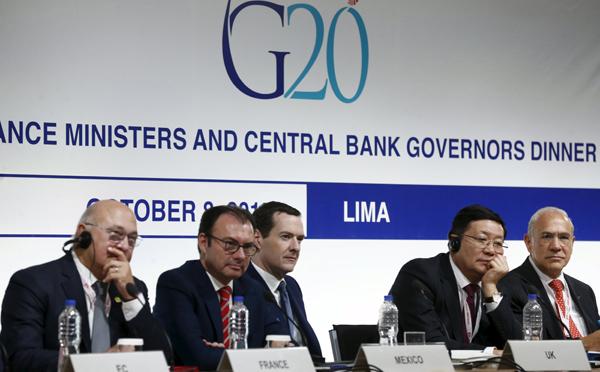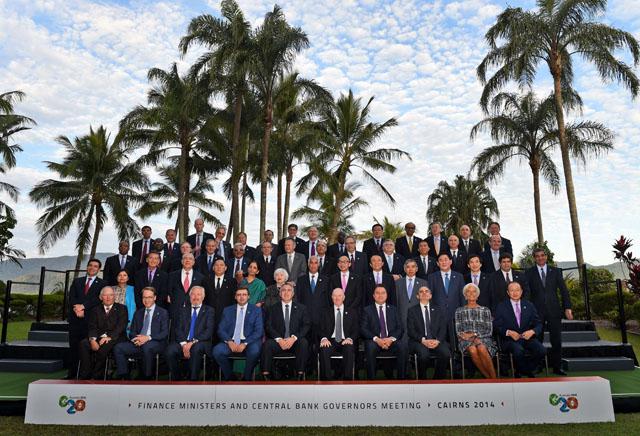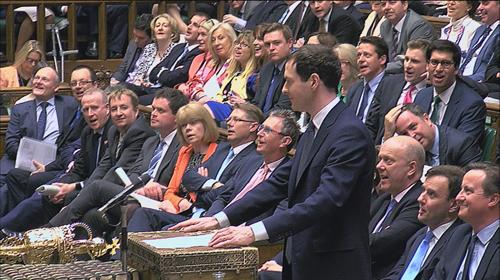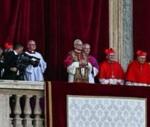You are here
Leading economies agree plan to fight corporate tax avoidance
By Agencies - Oct 11,2015 - Last updated at Oct 11,2015

Left to right: French Finance Minister Michel Sapin, Mexico's Finance Minister Luis Videgaray, Britain's Chancellor of the Exchequer George Osborne, China's Finance Minister Lou Jiwei and Organisation for Economic Cooperation and Development Secretary General Angel Gurria attend a finance ministers and central bank governors of the G-20 group news conference at the 2015 IMF/World Bank annual meetings in Lima, Peru, on Friday (Reuters photo )
LIMA — The Group of 20 (G-20) major economies have endorsed a package of measures to tackle corporate tax avoidance, but questions remain about whether countries will follow through on the plans or leave loopholes multinationals can exploit.
G-20 finance ministers agreed to back proposals drawn up by the Organisation for Economic Cooperation and Development (OECD) which aim to shake up rules dating back almost a century that govern taxation of profits from international commerce.
The ministers reached the agreement against a backdrop of concern about weak economic growth, tight government finances and media reports on the tax structuring used by companies including Starbucks and Google that have spurred public anger in Europe and the United States in recent years over tax avoidance.
"This is a reaction of people who cannot stand anymore that they pay their fair share of taxes, that they contribute to fiscal consolidation while companies, especially multinationals, can avoid tax," European Economic Affairs Commissioner Pierre Moscovici told Reuters.
The practice of so-called Base Erosion and Profit Shifting (BEPS) has allowed companies to move profits out of the countries where money is earned and into jurisdictions such as Luxembourg, Ireland or Bermuda that do not tax them.
The agreement endorsed by the G-20 ministers late on Thursday aims to close the gaps in existing international rules.
The plans include provisions to give governments a global picture of the operations of multinational companies, and minimum standards on so-called "treaty shopping" to put an end to the use of conduit companies to channel investments.
"The challenge is consistent implementation," said Pascal Saint-Amans, director of the OECD Centre for Tax Policy and Administration.
Technology companies are seen as the most adept at exploiting loopholes, but drug makers, medical device groups, banks, fast-food groups and retailers all commonly use contrived arrangements to cut their tax bills.
Tax advisers agree the measures could force many companies to restructure their operations and rethink how they fund themselves.
However, multinational enterprises (MNEs) will try to exert influence over the way the plans are implemented.
"The implementation phase now starts and MNEs and their advisers will have to continue to make their voice heard in the implementation phase to limit negative impacts on business," said Keith O'Donnell, board member at Taxand, which provides tax advice to multinational businesses.
"If certain states don't implement or implement partially, MNEs may be able to take advantage of this," he added.
The crackdown on corporate tax avoidance has been led by governments, who asked the OECD to develop the plans.
British Finance Minister George Osborne urged OECD chief Angel Gurria to put pressure on countries to enact the measures.
"I think he should call out countries that are not implementing what has been signed up to and hold our feet to the fire," Osborne said after the meeting of G-20 ministers in Lima.
G-20 leaders must now give final approval at a summit in November in Turkey, although the initiative was swiftly dismissed as lacking bite by one prominent critic.
The 15-point plan aims to tackle low tax bills for the likes of Google, Apple and McDonald's, which have managed to sharply reduce their taxes while remaining within the law, provoking public outrage in recent years.
Turkish Deputy Prime Minister Cevdet Yilmaz, who announced the G-20 decision, called it a "historic moment" for the fight against tax evasion.
He said the plan addressed a "very comprehensive set of issues" including profit-shifting across borders, corporations' use of no-tax status in multiple countries and the digital economy.
"These are very complicated issues that required an extensive technical effort and a hard-to-build consensus in some cases," he told a press conference in Lima,
But the work on consensus-building has only just begun.
Preventing companies from shifting profits to low-tax jurisdictions and debt to high-tax jurisdictions will require "a very large group of countries", particularly developing nations, to get on board with the plan, Yilmaz said.
International charity Oxfam has criticised the plan as a "toothless" package that will do nothing to stop poor nations being cheated out of billions of dollars.
"Rich governments are all bark and no bite when it comes to corporate tax dodging," said Oxfam's Manon Aubry when the plan was announced Monday.
But the OECD said it would give governments across the board a much-needed fiscal boost.
"Base erosion and profit shifting is sapping our economies of the resources needed to jump-start growth, tackle the effects of the global economic crisis and create better opportunities for all," said OECD Secretary General Gurria.
Globalisation loopholes
The man who supervised the drafting of the plan, the OECD's Pascal Saint-Amans, has said it means "playtime is over" for tax-dodging multinationals.
The OECD calculates that national governments lose $100 billion to $240 billion a year, or four to 10 per cent of global tax revenues, because of companies that game the system.
The plan, which applies to international companies with revenues of at least 750 million euros, seeks to make them pay tax in the country where their main business activity is based.
"It's not about paying low or high taxes, it's about paying your taxes," said Osborne.
The OECD has called for a multilateral deal by the end of 2016 enabling countries to update bilateral tax treaties in line with the new plan without the need to renegotiate them one by one.
The plan comes nearly a year after the "LuxLeaks" revelations that some of the world's biggest companies, including Pepsi and Ikea, lowered their tax rates to as little as one per cent in secret pacts with tax authorities in Luxembourg.
Luxembourg's Finance Minister Pierre Gramegna joined the calls for governments around the world to sign up for the new plan.
"We need a level playing field, which means we have to implement it all together and at the same pace," he said. "That is not the end of the story," said German Finance Minister Wolfgang Schaeuble.
"If there is no implementation it remains an impressive amount of paper," he added.
Related Articles
Financial leaders of the Group of 20 (G-20) top economies remain committed to chasing higher global growth, but were divided on how to achieve it as Germany pushed back at calls from the United States and others for more immediate stimulus.
DUBAI — The United Arab Emirates, home to the regional headquarters of numerous multinational companies, said Monday it would introduce a 15
LONDON — Britain unleashed more austerity this week in its latest annual budget and cut its growth outlook, blaming the impact of global mar
















